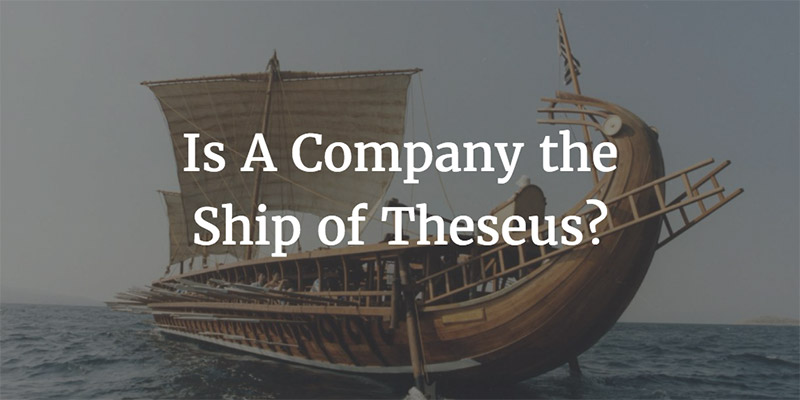My first big company job back in 2002 taught me a lot. I learned all about the nuances of the (at the time) 5,000-person business I had joined. I learned the people and the products. I learned how to get stuff done. And I witnessed echoes of the history of the company—stories about the previous CEO, lessons from the previous incarnations, tales of the previous products—before I got there.
I ended up staying about five years and saw the company merge with another, lose its name, change CEOs, change CEOs again, change CEOs again, change CEOs again, and then split from the acquirer. Along the way, most of the people whom I knew at the company moved on.
Recently, I was at an event and met that first CEO that I mentioned (the one that was there when I joined). He was on to running another company that’s doing very well. We talked about our old employer. We both realized that though the name, office, and products are mostly the same, the company is a totally different entity at this point—completely foreign to even him, the former CEO that ran it all.
As Gainsight’s grown, we haven’t merged with anyone or (thankfully) changed CEOs since I joined. But our team has evolved as we’ve scaled. New folks come in. Long-time employees move on. We believe in “The Alliance” by Reid Hoffman from LinkedIn: the idea that our company is a partnership between the business and our teammates—and the partnership needs to be renewed on a regular basis. If a teammate finds a compelling opportunity for their next phase outside of the company, we are excited for her or him.
But all of this change gets my “Mehtaphysical” brain thinking about what the fundamental nature of a company truly is. What’s the persistence of its identity? It’s not the people. It’s not the CEO. It’s not the products. It’s not even the name. How can the company be the same thing if every piece of it changes over time?
The Greek essayist Plutarch wrote of “Theseus’ paradox,” which rings true for me. From Wikipedia:
The ship of Theseus, also known as Theseus’ paradox, is a thought experiment that raises the question of whether an object that has had all of its components replaced remains fundamentally the same object. The paradox is most notably recorded by Plutarch in Life of Theseus from the late first century. Plutarch asked whether a ship that had been restored by replacing every single wooden part remained the same ship.
As a company grows and changes, every plank of its scaffolding eventually gets replaced. Maybe a few pieces remain from the original, but the majority of it is continuously different. Yet the company moves on.
You can look at this one of two ways: you can be melancholy about the “original ship” and worry that things are “different now,” or you can be energized that the ship is always new and beautiful thanks to the energy of the employees, customers, shareholders, and others that choose to work with it now. Our ships and companies can be born anew every day. Pretty inspiring, if you look at it that way.
Then again, the persistence of identity is highly questionable, as the Percy Bysshe Shelley tells us in Ozymandias!
I met a traveller from an antique land
Who said: Two vast and trunkless legs of stone
Stand in the desert. Near them, on the sand,
Half sunk, a shattered visage lies, whose frown,
And wrinkled lip, and sneer of cold command,
Tell that its sculptor well those passions read
Which yet survive, stamped on these lifeless things,
The hand that mocked them and the heart that fed:
And on the pedestal these words appear:
‘My name is Ozymandias, king of kings:
Look on my works, ye Mighty, and despair!’
Nothing beside remains. Round the decay
Of that colossal wreck, boundless and bare
The lone and level sands stretch far away.

